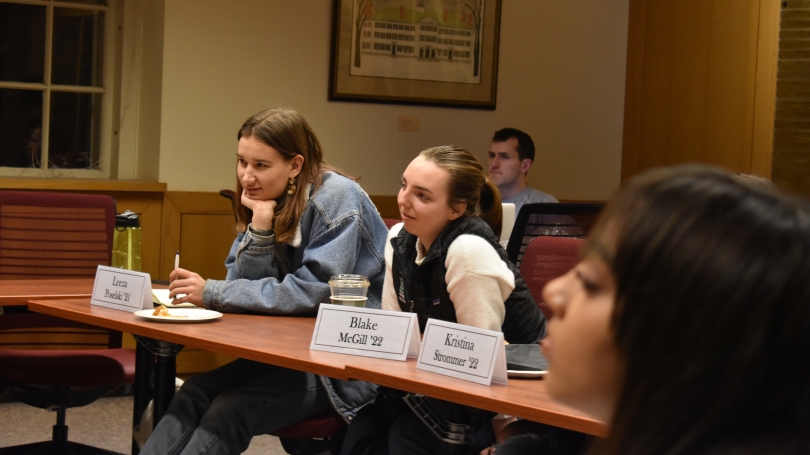
- Public Policy
- Leadership
- Funding
- News & Events
- About the Center
Back to Top Nav
Back to Top Nav
Back to Top Nav
Back to Top Nav
I stumble down the stairs to find all 14 other female students making posters for tomorrow’s rally. The next morning, at the Supreme Court, which happens to be our neighbor, justices will be hearing oral arguments in the most recent abortion case. I stand silently in front of signs reading “No Uterus, No Opinion” and “Never Again” intertwined in bloody coat hangers that cover our living room floor. I clutch my crucifix, grab a granola bar, and call my father: he will know what to do.
Prior to my junior spring semester away at the School for Ethics and Global Leadership (SEGL), I had lived a very sheltered life: Catholic school since I was three and friends who were mostly white, Catholic, pro-life, middle class, Fox News-watching conservatives. By the time I entered high school, I was desperate to learn and explore more, see the world, and challenge my views as well as others’. I decided to turn this hope into a reality. I logged onto my computer, found this semester program, completed the application, and the next year I was jetting off to “the big city” to find out what the rest of the world has to offer. During my time in D.C., I knew I would be in the ideological minority of 24 students, but I didn’t realize I would be outnumbered 20 to 4.
“I think you should go to the protest,” my father insists. “No photos though” he concedes. “You still have to come home at some point. Can’t have the whole town thinking you’ve gone liberal on us.” The next morning, I don my winter coat, throw my book bag over my shoulder, and follow my roommates turned pro-choice protesters down East Capitol Street. For the first hour of the rally, I stand in awkward silence in a sea of pro-life and pro-choice advocates, eyes darting between both sides, paralyzed, unsure of what to do. A “Pennsylvania Catholics for a Woman’s Choice” sign catches my eye.
I walk over to the older gentleman whose sign has captured my attention. “You know, the first women’s health clinics performing abortions were started by Catholic ministers,” he explains. I unclasp my hand from the crucifix around my neck, which I had apparently been gripping most of the morning. I feel my bubble begin to burst. This is the challenge to my beliefs I have been searching for, and it is terrifying. I return to my peers intrigued but still skeptical. I am glad to have met someone deeply religious who is not afraid to question church doctrine.
We return to our dorm’s study room that night and discuss the day’s events. Unsurprisingly, the protest is the number one topic of conversation. I sit in silence. A sound I’ve become accustomed to over the past several weeks. “Actually I disagree” I eventually chime in. We spend the rest of the night debating and discussing—civilly—before wishing and hugging each other good night. I am amazed; we can disagree on the definition of life, but care for each other despite our differences.
I spend the remainder of my time in Washington, D.C. being challenged, challenging my classmates, and developing meaningful relationships with those whom I had exchanged blank stares with just months before. This is what I see as the ideal educational experience. Honest and respectful banter that creates an environment where everyone feels they can freely express their views. Silence was never the answer. Silence is what halts progress. It is when both sides fail to communicate that everyone loses. I was able to be open to and respect opposing opinions, while presenting my view in a way that demands the same kind of consideration in return. I have much more to see and a lot more “bubble” to burst, but I know now that tackling the world head on requires me to open my mind and break my silence.